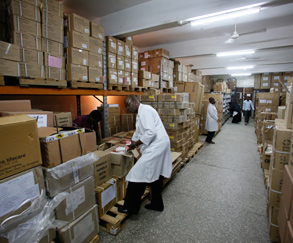The Supply Chain Management Advanced Module offered participants an understanding of the critical role of supply chains in malaria elimination and eradication, including supply/demand side drivers, incentives for intervention adoption, supply chain coordination for products with uncertain demand, and how to address key bottlenecks.
Led by Professors Michael Reich of the Harvard School of Public Health and Prashant Yadav of the Williams Davidson Institute at the University of Michigan, the module drew from the expertise of faculty from the Harvard Business School, Harvard School of Public Health, and experts from the private and nonprofit sectors. Primary challenges in the malaria supply chain include procurement and forecasting limitations (e.g., seasonally driven lead time to grow the plant extract used in ACT, upstream/downstream bottlenecks, etc.); inventory issues (e.g., product stock-outs, poor product distribution, storage problems); and transportation related obstacles (e.g., poor roads, ineffective transportation systems, geographic barriers).
These critical issues are relevant throughout all stages of disease control and elimination efforts—from the pre-elimination phase all the way through the elimination phase—at country and regional levels. The malaria supply chain is specifically vulnerable to variations in inventory; in particular, an observed phenomenon in forecast-driven distribution channels termed the bullwhip effect, which often results in stockpiling at the local or district level to protect against uncertainties. The availability of reliable, real-time information regarding market demand is therefore a critical factor to a well-functioning supply chain.

The malaria supply chain encompasses manufacturing of products such as bed nets, RDTs, and Artemisinin-based Combination Therapies (ACTs) as well as the procurement, distribution, and delivery functions necessary to ensure product availability for intended end-users.
